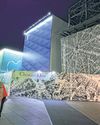CATEGORIES
Categories

Talk of the Town
In the heart of Milan, Molteni&C transforms a historic palazzo into a showcase for Italian craft

Cozy Time
Brigette Romanek spreads comfort and sophistication with Crate & Barrel

Block Party
After doing its time in trend jail, this building material is back in fashion

MOVABLE FEAST
AFTER YEARS OF LIVING IN LA, ACTOR WALTON GOGGINS AND DIRECTOR NADIA CONNERS IMAGINE A NEW LIFE FOR THEIR FAMILY IN THE HUDSON VALLEY

Generational Wisdom
Studio DB's Damian and Britt Zunino give new life to his childhood home in a classic Manhattan loft

Pastoral Poetry
Grace Fuller Marroquin adds new romance and lush beauty to a Hamptons home

Sound and Vision
Teaming up with The Rug Company once again, Kelly Wearstler transforms music into dynamic new material

Labor of Love
For design duo Kim Hostler and Juliet Burrows, home is where the art is

Taking It Slow
CREATIVE COUPLE MARIE-LOUISE AND MARC HOM THOUGHTFULLY UPDATE A HISTORIC RETREAT IN COOPERSTOWN, NEW YORK

ripple effect
Designed by Diller Scofidio + Renfro for Her Highness Sheikha Moza bint Nasser of Qatar, a new women's mosque in. Doha champions a spiritual and educational model for the wider Islamic world

LOVE LANGUAGE
In her new home in NYC, Celerie Kemble makes room for all the things and people she cherishes

CULTURE CLUB
Neda Kakhsaz and Zabie Mustafa of Studio MUKA pay homage to their Persian and Uzbek roots in the couple's distinctly modern Los Angeles home

Stuck In Place
Why Americans stopped moving houses-and why that's a very big problem

HISTORY BUFFED
In Portland, Oregon, an artistic family turns to Jessica Helgerson to help make an old house feel fresh

Who's Your Mommy?
I knew that becoming a parent would change me. I just didn't know how.

MY PEDALBOARD STEVE HACKETT
WHAT THE PROG-ROCK ICON SEES WHEN HE LOOKS DOWN

Anglo American to Retain Stake in Platinum Business
Anglo American said it will retain a 19.9% stake in Anglo American Platinum after its planned demerger this summer.

'Love Hurts' Star Turns To Spielberg For Advice
On the set of \"Indiana Jones and the Temple of Doom,\" Steven Spielberg and George Lucas hired a martial arts instructor to teach a 12-year-old Ke Huy Quan how to kick.

Thrifty Couples Sprint to the Altar
Accelerating your wedding timeline offers lots of opportunities for saving as venues try to fill last-minute cancellations

Yasmin Williams
A FOLK GUITAR VIRTUOSO BRANCHES OUT ON HER THIRD ALBUM, ACADIA

Seven Stringer
Spiritbox guitarist Mike Stringer dispels the illusion of the band’s overnight success” while being stoked about their new album and playing to massive crowds

Sealing These Letters With a Big Kiss Is an Impossible Feat
Even So, Electronic Mail Links Writers Around the Globe; Missing: Perfumed Pages

China's Love Affair With Luxury Has Cooled
Xie Weina used to buy luxury bags that cost $1,500 or more every couple of months. Last year, instead of bags, she spent about $2,800 on a gym membership and Pilates lessons.

Martial Artists
COBRA KAI COMPOSERS ZACH ROBINSON AND LEO BIRENBERG TALK GEAR, SEASON 6 AND HOW THEY CONSCRIPTED TOSIN ABASI, CHARLIE ROBBINS AND POLYPHIA'S TIM HENSON INTO THEIR MUSICAL DOJO

EU Is Preparing New Sanctions On 'Shadow Fleet'
EU officials are close to an agreement to list more than 70 vessels.

Rioters Say Pardons Apply to Other Crimes
Defendants argue they should also be absolved of additional charges

City Is Lab for Trump-Style Government
'Surf City USA' council embraces MAGA ideas in blue state of California

Western Tech Companies Avoid China
As tensions rise, some firms are moving production to other nations

The Indoor Mile Record Stood for Years. Then It Fell Twice in Five Days.
One week ago, Yared Nuguse was walking on air.

Released Gaza Hostages Face Long, Wrenching Recoveries
Nightmares, injuries and survivor's guilt haunt former captives for months after being freed; my body is still tense’